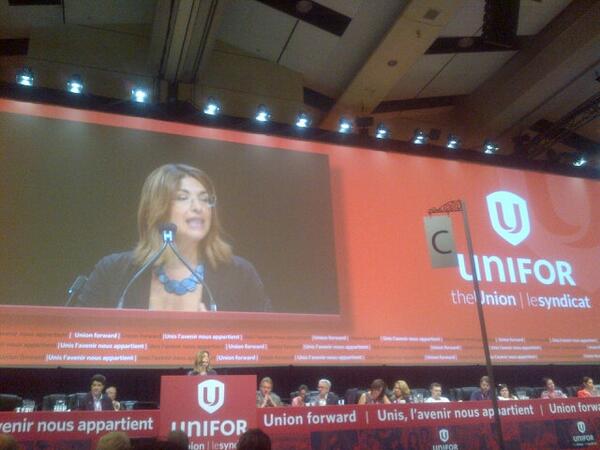This article was originally published by the Canadian Association of Labour Media (CALM) and is reprinted here with permission.
Naomi Klein urged members at the founding convention of Unifor in Toronto to take the lead in ushering in a green labour revolution, setting out a bold vision to reverse the damage of the neoliberal era and create just and dignified work while simultaneously protecting the environment.
The best-selling author argued that climate change is not a threat to jobs, but is instead the most important tool and argument against the austerity agenda that is working neither for people nor the planet.
“If Unifor becomes the voice for a boldly different economic model, one that provides solutions both to the attacks on working people and the attacks on the earth itself, then you can stop worrying about your continued relevance,” Klein said.
Workers in Canada are facing a classic example of the tactic Klein documented in her book, The Shock Doctrine, whereby right-wing interests systematically exploit crises — whether economic shocks, natural disasters, or wars — to impose pro-corporate policies. These policies — deregulation, cuts to social spending and privatization — do not solve underlying problems but only enrich a small elite.
Mass mobilizations responding to austerity in Canada and in Greece, Spain, and the United States have unleashed a more radical imagination, mobilized massive numbers, and developed new kinds of democratic organizing, but have had difficulty achieving their aims.
“We’ve occupied Wall Street and Bay Street and countless other streets. And yet the attacks keep coming,” Klein said.
These movements need the durability that only organized labour can provide, she argued.
“They need your institutional strength, your radical history, and perhaps most of all, your ability to act as an anchor so that we don’t keep rising up and disappearing again,” Klein said. “We need you to be our fixed address, our base, so that next time we are impossible to evict.”
Klein said that alliances with community groups and social movements — already initiated by the CAW at Port Elgin last November 2012, when a hundred activists from across the country met and dialogued with labour representatives — is an important start. But Klein said that rejecting the neoliberal agenda is not enough — the labour movement needs a compelling vision of its own.
“We can’t just reject their lies. We need truths so powerful that their lies can’t survive contact with them. We can’t just reject their project. We need our own project.”
Klein called Stephen Harper’s main project “extractivism,” a single-minded natural resource extraction agenda for which he has sacrificed the manufacturing base of the country and attacked worker’s most basic collective rights.
Klein’s argument is that climate change is an argument vividly demonstrating the failutre of this logic of continual extraction and profit.
“[Climate change] is a powerful message — spoken in the language of fires, floods, storms and droughts — telling us that we need a whole new economic model, one based on justice and sustainability,” Klein said.
She suggested that solutions to climate change are already at the heart of many of the labour movement’s existing demands and in fact “vindicate much of what the left has been working towards for decades.”
Addressing climate change will require a revival and reinvention of the public sphere, with clean and affordable transport, energy efficient housing, major investment in infrastructure — a transformation that could create millions of new, high-paying jobs.
It would also require expanding those sectors of work that are low carbon, like personal care, sanitation and service sector workers.
Klein cited a Canadian Centre for Policy Alternatives report that compared the public value from a $5 billion investment in a pipeline — like the Enbridge Gateway — to the same amount of money invested in green industrial development.
While the pipeline might offer short-term construction jobs, it would also lead to big private sector profits and devastating public costs for future environmental damage. But spending that same money on public transit, building retrofits and renewable energy would create at least three times as many jobs — as well as a safer future.
To achieve this would require “breaking every rule in the free-market playbook.”
She suggested a key demand could be “energy democracy,” which would entail the creation of new crown corporations in energy and a democratically controlled, decentralized energy system operated in the public interest.
She encouraged union members to consider direct action, rather than waiting for the government to act.
“Next time they close a factory making fossil-fuel machinery — whether cars, tractors, or airplanes — don’t let them do it,” she said. “Do what workers are doing from Argentina to Greece to Chicago: occupy the factory. Turn it into a green worker co-op. Go beyond negotiating a last, sad severance. Demand the resources — from companies and governments — to start building the new economy right now.”
Klein also stressed the importance of alliances with Indigenous communities who she called the “biggest barrier” that Harper faces to “his vision of Canada as an extraction and export machine – a country-sized sacrifice zone.”
If Unifor can achieve the social unionism promised in its new constitution, Klein said that it would be an inspiration to many and be a force to be contended with.
“You will be on the front lines of the fight for the future, and everyone else — including the opposition parties — will have to follow or be left behind.”
Martin Lukacs is a Montreal-based journalist.



